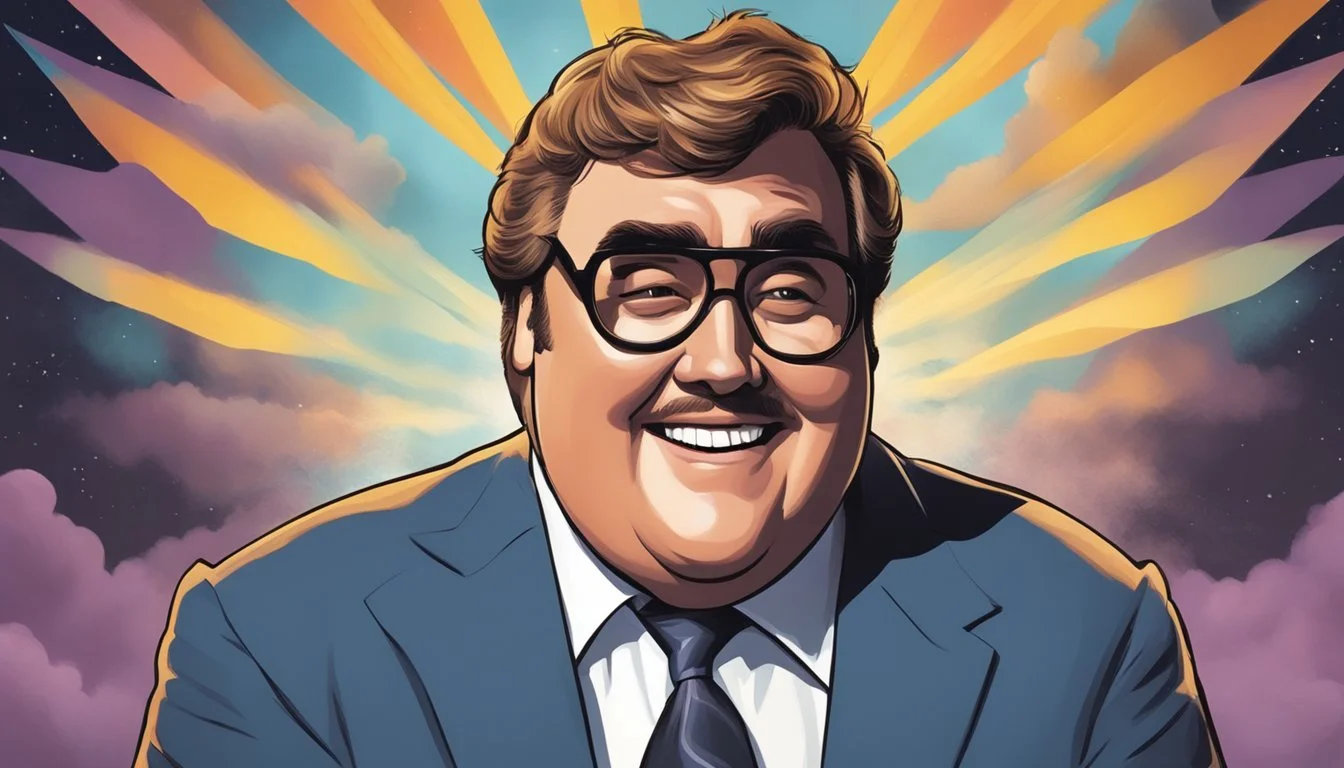Comedy and Crisis: John Candy's Battle with Depression
The Hidden Struggle Behind the Laughter
John Candy's comic genius illuminated screens and stages, bringing laughter to millions. Yet behind his jovial exterior, the beloved Canadian actor grappled with depression that cast a shadow over his life and career. Despite his struggles with mental health, Candy's immense talent and humor shone through in iconic roles that continue to captivate audiences decades after his untimely passing.
Candy's journey from Toronto to Hollywood stardom was marked by both triumph and tribulation. His early life was shaped by personal loss, losing his father at just 4 years old. This tragedy planted seeds of melancholy that would resurface throughout his adult years, even as he rose to fame through his work on SCTV and in blockbuster films.
The pressure of maintaining his public persona as a lovable funnyman took its toll on Candy's mental well-being. While he brought joy to countless fans, he privately battled depression and self-doubt. His story serves as a poignant reminder that even those who make us laugh the hardest may be fighting inner demons.
Early Life and Rise to Fame
John Candy's journey from a small-town upbringing to Hollywood stardom was marked by natural comedic talent and perseverance. His early experiences and breakthrough roles shaped his career trajectory.
Humble Beginnings in Newmarket, Ontario
Born on October 31, 1950, in Newmarket, Ontario, John Candy grew up in a middle-class family. His father, Sidney, worked as a car salesman. Tragedy struck early when Sidney died from heart disease complications in 1955, leaving 4-year-old John and his older brother Jim without a father.
This loss profoundly impacted Candy's childhood. He attended Neil McNeil Catholic High School, where he developed an interest in football and acting. His natural charisma and ability to make others laugh became evident during his school years.
Breakthrough with Second City Television
Candy's comedic talents flourished at Toronto's Second City improv theater. He joined the troupe in 1972, honing his skills alongside future stars like Dan Aykroyd and Gilda Radner.
His big break came with SCTV (Second City Television) in 1976. The sketch comedy show became a launchpad for Candy's career. He created memorable characters like Johnny LaRue and gained widespread recognition for his versatility and timing.
SCTV's success led to Emmy Awards and critical acclaim. Candy's performances caught the attention of Hollywood producers, setting the stage for his transition to film.
Transition into Hollywood Films
Candy's film career took off in the early 1980s. He appeared in small roles in productions like "The Blues Brothers" (1980), working with SNL alum John Belushi.
His breakout role came in "Stripes" (1981), starring alongside Bill Murray. This success led to leading roles in comedies like "Splash" (1984) and "Uncle Buck" (1989).
Candy's warm screen presence and everyman appeal resonated with audiences. He became one of Hollywood's most beloved comic actors, known for both his physical comedy and dramatic depth.
Iconic Roles and Career Highlights
John Candy's comedic talent and versatile acting skills led to a prolific career filled with memorable performances. He brought warmth and humor to a wide range of characters, collaborating with comedy giants and earning industry recognition along the way.
Memorable Performances in Film
Candy's breakout role came in 1981's "Stripes" as lovable recruit Dewey "Ox" Oxberger. He went on to star in the 1984 hit "Splash" as Tom Hanks' wisecracking brother. In 1987, Candy delivered one of his most iconic performances in "Planes, Trains and Automobiles" opposite Steve Martin.
The 1989 John Hughes film "Uncle Buck" showcased Candy's ability to blend humor with heart as the unconventional caretaker Buck Russell. He brought his trademark charm to 1993's "Cool Runnings" as the coach of the Jamaican bobsled team.
Other notable films include "The Great Outdoors" (1988) and "Summer Rental" (1985). Candy also made a brief but memorable appearance in the holiday classic "Home Alone" (1990).
Collaborations with Leading Comedians
Candy frequently collaborated with fellow comedy stars, forming dynamic on-screen partnerships. His work with Steve Martin in "Planes, Trains and Automobiles" is considered a comedy classic.
He appeared alongside Dan Aykroyd in several films, including a cameo in "Ghostbusters" (1984) and starring roles in "The Great Outdoors" and "Nothing But Trouble" (1991).
John Hughes was a frequent collaborator, directing Candy in "Planes, Trains and Automobiles," "Uncle Buck," and "The Great Outdoors." This partnership allowed Candy to showcase both his comedic talents and his ability to portray relatable, endearing characters.
Awards and Accolades
While primarily known for his film work, Candy's television performances earned him critical acclaim. He won two Emmy Awards for his writing contributions to the sketch comedy series "SCTV Network 90" in 1981 and 1982.
Candy's film roles, though widely beloved, did not result in major award wins. However, he received American Comedy Award nominations for Funniest Actor in a Motion Picture for "Uncle Buck" and "Only the Lonely" (1991).
His impact on comedy was recognized posthumously with induction into Canada's Walk of Fame in 1998 and the Canadian Comedy Hall of Fame in 2000.
Personal Struggles and Public Battles
John Candy's life was marked by internal challenges that contrasted sharply with his jovial public persona. His struggles with mental health and physical well-being impacted both his personal life and professional career.
John Candy's Battle with Depression
Depression cast a shadow over John Candy's life, often hidden behind his cheerful on-screen characters. The pressure of fame and the entertainment industry's demands took their toll on his mental health. Candy faced periods of low mood and self-doubt, which he rarely discussed publicly.
His depression likely contributed to some of his unhealthy coping mechanisms. Candy sometimes turned to food and alcohol for comfort, exacerbating his health issues. Despite these challenges, he continued to work and bring laughter to audiences.
Friends and colleagues noted Candy's ability to mask his inner turmoil with humor. This skill, while beneficial for his career, made it difficult for others to recognize the depth of his struggle.
Health Concerns and Lifestyle
Candy's physical health was a constant concern throughout his adult life. His weight fluctuated significantly, at times reaching over 300 pounds. This excess weight put strain on his heart and overall health.
The actor made several attempts to adopt healthier habits. He tried various diets and exercise regimens, but found it challenging to maintain long-term changes. His busy filming schedule and frequent travel complicated his efforts to establish a consistent healthy routine.
Candy's family life was affected by his health struggles. He worried about leaving his children fatherless and made efforts to improve his lifestyle for their sake. Tragically, these concerns proved prescient when Candy suffered a fatal heart attack at age 43 while filming in Mexico.
Candy's Legacy and Influence
John Candy's impact on comedy and film continues to resonate years after his passing. His unique blend of humor and warmth inspired countless performers and left an indelible mark on popular culture.
Influence on Future Generations of Comedians
Many modern comedic actors cite John Candy as a major influence. His ability to combine physical comedy with genuine emotion set a high bar for future performers. Candy's work in sketch comedy, particularly on SCTV, laid the groundwork for shows like Saturday Night Live and Key & Peele.
Canadian comedians especially look to Candy as a trailblazer who proved international success was possible. His generosity on set and willingness to mentor young talent helped shape the careers of many up-and-coming actors.
Tributes and Remembrance in Popular Culture
Candy's legacy lives on through various tributes in film and television. Documentaries exploring his life and career have introduced new generations to his work. His children, Jennifer and Christopher Candy, have worked to preserve their father's memory through charity events and interviews.
Many films and TV shows pay homage to Candy's characters and comedic style. References to his iconic roles appear in modern productions, keeping his spirit alive in popular culture.
Celebrity fans often share their favorite John Candy moments on social media, sparking renewed interest in his films. This ongoing appreciation ensures that Candy's contributions to comedy remain relevant and celebrated.
Final Projects and Untimely Passing
John Candy's final years were marked by two notable film projects and his sudden passing while on set. His last roles reflected his enduring comedic talents, while his death shocked the entertainment world.
Candy's Last Films
John Candy's final film appearances were in "Wagons East" and "Canadian Bacon." "Wagons East," a Western comedy, was in production when Candy passed away. The film was completed using stand-ins and released posthumously in 1994.
"Canadian Bacon," directed by Michael Moore, became Candy's last completed film. In this political satire, Candy played an American sheriff caught up in a faux war with Canada. The movie was released in 1995, over a year after his death.
These projects showcased Candy's versatility as an actor, even in the twilight of his career.
Details of Candy's Passing and Immediate Reactions
On March 4, 1994, John Candy suffered a fatal heart attack while filming "Wagons East" in Durango, Mexico. He was 43 years old. The news of his sudden death sent shockwaves through Hollywood and his native Canada.
Candy had been battling weight issues and had a family history of heart disease. His passing highlighted the health risks associated with obesity and stress in the entertainment industry.
The entertainment world mourned the loss of a comedic genius. Tributes poured in from colleagues and fans alike, celebrating Candy's warmth, humor, and contributions to cinema.





